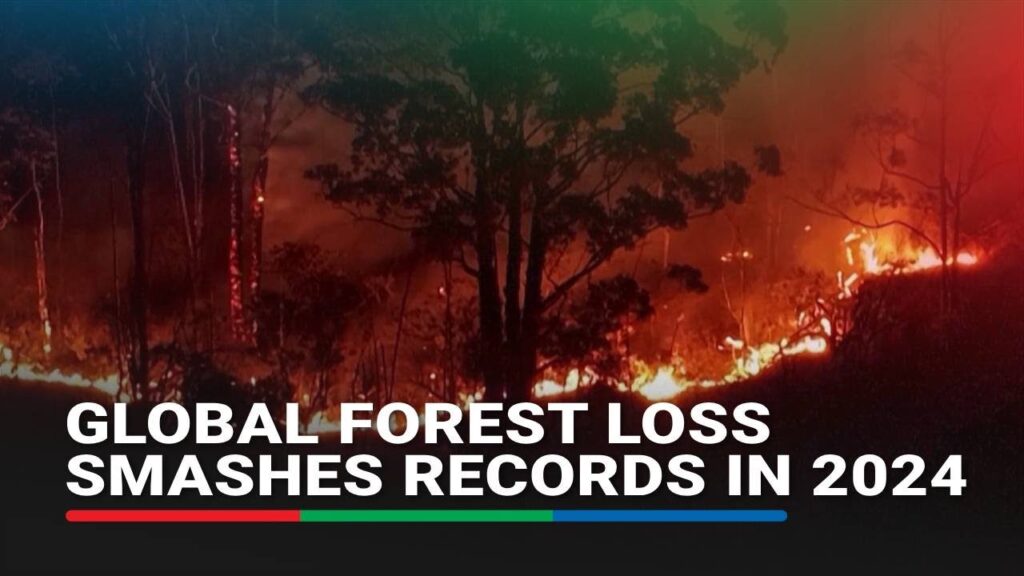
Massive fires fueled by climate change led global forest loss to smash records in 2024, according to a report issued on Wednesday (May 21).
Loss of tropical pristine forests alone reached 6.7 million hectares, an 80% spike compared to 2023 and an area the size of Panama, mainly because Brazil, the host of the next global climate summit in November, struggled to contain fires in the Amazon amid the worst drought ever recorded in the rainforest. A myriad of other countries, including Bolivia and Canada, were also ravaged by wildfires.
It was the first time that the annual report, issued by the World Resources Institute and the University of Maryland, showed fires as the leading cause of tropical forest loss, a grim milestone for a naturally humid ecosystem that is not supposed to burn at all.
Latin America was hit particularly hard, the report said, with the Amazon biome hitting its highest level of primary forest loss since 2016. Brazil, which holds the largest share of the world’s tropical forests, lost 2.8 million hectares, the most of any country. It was a reversal of the progress made in 2023, when President Luiz Inacio Lula da Silva took office promising to protect the world’s largest rainforest.
Bolivia overtook the Democratic Republic of Congo as the second country with the most tropical forest loss despite having less than half the amount of forested as the African nation, which also saw a spike in forest loss last year.
Bolivia’s forest loss surged by 200% in 2024, with a drought, wildfires and a government-incentivized agricultural expansion as the leading causes. Across Latin America, the report noted similar trends in Mexico, Peru, Nicaragua, and Guatemala. Conflicts in Colombia and the Democratic Republic of Congo also boosted deforestation rates, as armed groups used up natural resources.
Outside the tropics, boreal forests, which evolved with seasonal fires, also posted record-high tree loss in 2024, with Canada and Russia each losing 5.2 million hectares in 2024 as wildfires got out of control.
Southeast Asia bucked the global trend, with Malaysia, Laos, and Indonesia all posting double-digit decreases in primary forest loss, as domestic conservation policy, combined with efforts by communities and the private sector continued to effectively contain fires and agricultural expansion.
Another outlier was the Charagua Iyambae Indigenous territory in southern Bolivia, which was able to keep the country’s record fires at bay through land-use policies and early warning systems.
Rod Taylor, the global director for forests at the WRI, said that as leaders descend in the Amazonian city of Belem for the next climate summit, he would like to see countries make progress in introducing better funding mechanisms for conservation.
(Production: Lais Morais, Nina Lopez)
For more ABS-CBN News videos, click the link below:
https://www.youtube.com/playlist?list=PLgyY1WylJUmhXo7UT_-mepqGYjtDji48L
For more latest news and analysis from ABS-CBN News videos, click the link below:
https://www.youtube.com/playlist?list=PLgyY1WylJUmg4pcvfM9a96rbUcLD_0P_U
For more News Digital News Raw Cuts, click the link below:
https://www.youtube.com/playlist?list=PLgyY1WylJUmi83yKJH8Dv0p_3D4cyZKzV
Subscribe to the ABS-CBN News channel! – http://bit.ly/TheABSCBNNews
Watch the full episodes of TV Patrol on iWantTFC:
http://bit.ly/TVPatrol-iWantTFC
Visit our website at http://news.abs-cbn.com
Facebook: https://www.facebook.com/abscbnNEWS
Twitter: https://twitter.com/abscbnnews
#ABSCBN
#LatestNews
#ABSCBNNews
source




thanks trump !